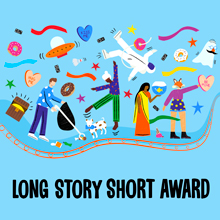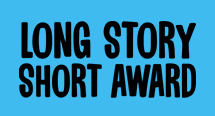Ever since his arrival on Molly's birthday, Kite had longed to feel the wind in his ribbons. But whenever Molly suggested taking him outside, Mummy had a reason to say no . . . "It's too cold.""It's ... [+]
Dad is from Texas. He is the oldest brother out of four—two younger brothers and one older sister. He'd flown in the Air Force, the tip of his head scraping the heavens but always winding up with his feet back down in the dirt. He found homes in military bases across the world, learning foreign tongues and gaining new perspectives in Japan, France, Germany, Guam, the Philippines, and Korea. He had a slight Southern twang that was only noticeable when he was on the phone with his family. He was a man of the West but loved Eastern cultures. His first marriage was to a girl from Korea, and they had two daughters. Their young family moved from country to country, and when they finally settled back down in America, things grew cracked and fractured and stayed that way. The earth was never still again beneath them. It was years later when he was a veteran that he met a young immigrant from China, who smelled like hope and orange blossoms, and gave him two more daughters. They kept him grounded.
Mom was a bright-eyed schoolgirl in Tiananmen Square. A raised fist in a throng of students wearing their best uniforms. She watched with a dewy gaze as protesters proclaimed their cause, and visions filled her dreams of a transformed, liberated China. She didn't quite understand the extent of what she was fighting for, but she was swept up in the enthusiasm of all her friends and older students she looked up to. She shouted their slogans and collected donations, and for the first time, she had become part of something that was greater than her.
Although the protests ended in the bloodshed of hundreds of students and laborers, it was a spark that lit a change not only in China, but inside my mother. Years later, she would come to realize the visions of democracy and possibility seeded by that rebellion in a new country.
In America, she started out as an accountant, counting pennies and rubbing them together. She was still hungry for more. She absorbed a new tongue, determined to perfect the American accent, and eliminate her own. She permed her hair and lightened it from onyx to a burnt sienna. She named herself Fawn, an ode to her new hair color and a Westernized echo of her Chinese name, Xiao Fang. She had dreams for her children to go to the best American schools, marry American men, have American children, and become every bit of America she knew she could never fully be. She started a family business, a global enterprise that would take them from one faraway conference hall across the ocean to another. When her girls were younger, she would leave them at home with a nanny as she'd fly overseas, always bringing back little pieces of the world for them until they were old enough to see it for themselves.
Dad sought solace in K-dramas. In the glow of the television light, he is a sculpture, the Seated Boxer with a Coke fizzing in his hand. His experiences have carved themselves under his eyes and his years have deepened his smile lines and stretched the skin under his chin. The sun has stolen the yellow from his once-blonde hair and he is left with the roar of airplane engines in his ears. He travels from time to time still, but would rather enjoy the world from his sagging leather recliner through a technicolor window.
I saw the world in fragments growing up. Pale imitations were given to me in glances. In the mirror I saw someone who looked not-quite Chinese, but not-quite White. I longed for my mother's sleek black hair, and my father's steady blue eyes, but I had pools of ochre and brunette waves that frizzed out in the summers.
"Chinglish" was the official household language. Sentences in Mandarin would devolve when an unknown noun was replaced with an English substitute, and my mother would laugh while my grandma would scowl in confusion. My father's early attempts at speaking Chinese were inundated by horrific pronunciation, and he eventually gave up, comforting himself with his French and German proficiencies.
In my childhood bedroom, snowglobes were scattered on the shelves. There were storybook villages covered in snow, and then more familiar lands like New York, with sparkles dusting the Empire State building. I would turn them upside down and transport; disappearing among evergreen trees and cozily lit houses, city streets and skyscrapers with a hundred stories.
Other trinkets cluttered the corners of my room. I had a fan collection my mother brought me back from a trip to China, along with some traditional opera headdresses. I had a painted rocking horse ornament my father brought me back from Germany. I wondered about the painted faces behind the fans, the heads that such headpieces would have graced, and the hands that must have carefully crafted the exquisite tiny horse. I wandered in worlds that were trapped in glass.
Over the years, the glass began to crack. A flip of the palm became fourteen hour flights, journeying outside the bounds of my bedroom into the stratosphere. My sister and I were positioned with silver spoons in our mouths, and a growing appetite for travel. My parents guided us hand-in-hand as we were shepherded through airports in Riyadh and ports in the Caribbean, peeking at the world through the cracks between our fingers.
I found myself alone at the top of Uetliberg mountain in Zürich, Switzerland when the glass shattered. The sky was clouded with misty crystals and at the highest point in Zürich, I couldn't see much more beyond the tops of the trees poking through the fog that blotted out the city below. Beyond the company of a few other straggler tourists, the area was deserted because of the dismal viewing weather. Because the view at the top was obscured, I embarked down the mountain on the Planetenweg trail, which was modeled on the solar system. Every meter I covered was one of the millions of kilometers from the sun to Pluto. I was an astronaut on my first solo mission, piloting myself past stenciled signposts marking Mercury, Venus, Jupiter and other planets, stopping at scenic outlooks on the way. Sunlight finally leaked through clouds and Lake Zürich glittered below, mirroring the sky. It was like looking into my father's eyes.
As I sat in my blue economy class seat on the airplane home, I gazed out as the sun sunk into an ocean of clouds, casting an orange beam across the horizon. I imagined my father in the cockpit, looking out at the same sky and knowing he was never tired of the view. When we touched down on the tarmac, I thought of my mother. She was the gravity that kept us on the ground, the force that brought us together and propelled us forward. I have the weight of my parents' hopes and history on my plate, piled on with dreams and ambitions of my own. I still have room for dessert.



